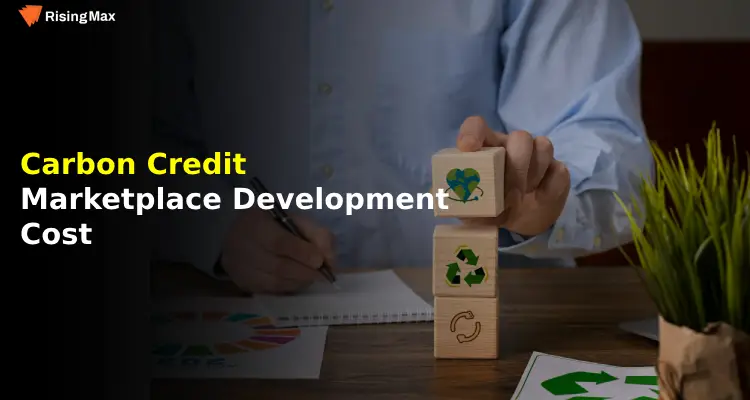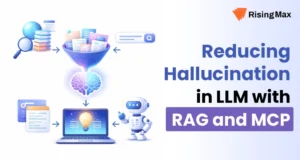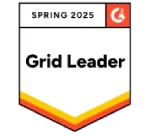The carbon credit marketplace development cost is $40k-$250k.
This is an estimated price range because numerous factors impact the carbon credit platform development cost. In this article, we have emphasized the intricacies of the functionalities and technologies of the platform. Talk to our experts, discuss your requirements, and get an exact price quote.
The carbon credit marketplace serves a great purpose for mankind. It’s an ideal way for individuals as well as businesses to offset carbon emissions. Developing a blockchain based carbon credit platform will place you in the category of woke entrepreneurs who give priority to sustainability and strive for planet-friendly activities.

Why Are Businesses Motivated To Develop a Carbon Credit Marketplace?
The existence of greenhouse gasses is continuously on the rise, and there is a lot of concern about carbon emissions that need to be curbed. With the constant awareness growing around maintaining an ecological life balance, there needs to be a platform that will make a contribution towards the reduction of poisonous emissions.
Witnessing such adverse effects, entrepreneurs globally are focused on building platforms that have the potential to prevent the expansion of poisonous gasses in the future. Moreover, to ensure transparency, blockchain is considered the best choice altogether. It opens the doors for all kinds of investors to participate fully in the fight against climate change. The tokenized carbon credits and their usage are effectively tracked to check whether the system is advantageous to the planet.
There is an actual need in society for a platform that can combat the challenges surfacing around this global issue. The onus is on the global organizations to invest in a powerful solution that tackles serious climatic issues and takes a positive step toward a greener future. Here, we have mentioned the major reasons why businesses are heavily invested in this project;
Long-Term Sustainability
Engaging in carbon offset projects helps contribute to the long-term sustainability of the planet, ensuring a healthier environment for future generations and securing business continuity.
Environmental Impact
By developing a carbon credit marketplace, businesses will be able to offset their carbon emissions and make a substantial move towards eco-friendly projects.
Risk Management
Funding in carbon credits can prevent future carbon pricing risks and regulatory changes, thereby offering stability to extended business planning.
Social Concern
Getting associated with carbon offsetting exemplifies a social concern towards environmental sustainability, thereby elevating a company’s CSR profile & reputation across the globe.
Book a meeting with our consultants for a detailed carbon credit platform development cost analysis!
Factors Affecting The Cost Of Carbon Credit Marketplace Development Cost
Developing a carbon credit marketplace platform with stupendous features and without errors is a complicated process. There are various aspects that influence the overall budget; take a look at some of them;
Development Process
The development process has a huge impact on expenses. Following agile methodologies and having a strong focus on the app development cycles greatly results in enhanced flexibility, which could increase the carbon credit platform development costs. There are a series of steps that need serious consideration and take substantial time and effort.
| Development Process | Cost Estimation |
| Consultation | $3000-$4000 |
| Planning And Research | $4500-$5500 |
| Designing | $5000-$6000 |
| Development | $7000-$8000 |
| Testing | $5500-$6500 |
| Launch And Maintenance | $5000-$6500 |
| Marketing | >$5500 |
Blockchain Networks
Different blockchains are required to carry out various transactions over a secure network. Majorly, they are categorized into public and private blockchains.
The former is a permissionless distributed ledger for everyone to conduct transactions, offering users access to several historical records. The data is available to all node members, and with proof-of-work, no fraudulent transaction takes place.
The private blockchain works in a restricted network and is used specifically within the firm without access to outside members. Due to fewer nodes, the speed becomes faster, completing the transaction instantly. Moreover, the scalability is top-notch, enabling the firms to increase/decrease the size of the network.
Hence, it is quite understandable that Private Blockchain networks are expensive in terms of setting up and overall maintenance due to specific data storage and computing power.
| Type Of Blockchain Network | Development Cost |
| Public blockchain | $40,000 – $50,000 |
| Private blockchain | >$50,000 |
Technology Stacks
Tech-stacks is an essential choice because it uses advanced programming languages and software frameworks for creating a robust and secure online platform. A seamless and user-friendly interface manages to attract users big time. Building a platform with professional UI/UX design amplifies the visual appeal and usability.
| Tech-Stacks | Cost Estimation |
| Programming Languages | $7,000 – $12,000 |
| APIs | $5,000 – $8,000 |
| Frameworks | $6,000 – $9,000 |
| Artificial Intelligence | $8,000 – $15,000 |
| Operating System | $10,000 – $14,000 |
| Cloud Storage | $12,000 – $15,000 |
| Database | $7,000 – $12,000 |
How Can Carbon Credit Marketplace Platform Development Be Made Cost-Effective?
The adoption of systematic development procedures and streamlining the business operations work well for saving costs without hampering the project scope.
Strategic Approach
Clearly defining the project scope, understanding the requirements, and defining the features create a well-planned roadmap that saves massive time and costs.
Effective Project Management
Adopting a solid approach and following an agile methodology helps in smooth project completion. It allows the segmentation of projects into different phases to ensure timely delivery, enhanced performance, transparency, and massive profits.
Using Smart Contracts
Developing smart contracts helps streamline the entire carbon credit trading procedure by supporting automation and eliminating intermediaries.
Tech Infrastructure
The availability of proper infrastructure for cloud, security, data & risk management plays a pivotal role in improving scalability, cost reduction, optimized efficiency, and boosted productivity.
RisingMax is a prominent name in the IT world and has enough experience and expertise to develop fantastic platforms. If you are eager to build such a platform, schedule a meeting with our team. We will provide you with a detailed cost breakdown to ease your queries.
Future of Carbon Credit Marketplace
The innovative carbon credit marketplace is considered to be a positive step that has remodeled the way of addressing carbon emissions. Powered by blockchain technology, it has a lot of scope, and the future looks extremely promising. The integration of advanced technologies like blockchain and AI instills transparency, traceability, and efficiency in carbon credit marketplaces, which are responsible for lowering transaction costs and enhancing trust among stakeholders.
The voluntary carbon market is predicted to grow significantly as the majority of businesses, investors, and individuals want to mitigate their carbon footprints and drive demand for carbon credits. Moreover, there will be more focus on nature-based solutions that steer toward climate mitigation and increased investment in projects related to reforestation and conservation.
Carbon neutrality is picking up pace and will soon become a mainstream goal for businesses of all sizes. For that, carbon credit marketplaces will serve as a crucial tool in acquiring carbon neutrality targets. In the upcoming times, businesses will universally integrate carbon offsetting into their supply chain management strategies. This will create a huge demand for carbon credits and, therefore, foster a solid collaboration across industries.
Trusted Blockchain Experts Will Directly Address Your Project Related Queries
Send Your Requirements And Get An Assessment
What Are The Reasons For Hiring Us For Your Carbon Credit Platform Development?
RisingMax is a leading blockchain development company with over a decade of experience in the IT industry. Our vetted developers have the potential and credentials to build a fully functional and dynamic platform. Talk to our experts, present your project, and get accurate cost details.
- Team Strength
- Technical Expertise
- On-time Project Delivery
- Advanced Tech stacks
- Blockchain Integration
- Affordable Prices
- 24*7 Customer Support
It’s time to connect with our team and kickstart your development journey! RisingMax is a well-known custom software development company with the expertise to build a carbon credit platform at cost-effective prices.
FAQs On Carbon Credit Marketplace Platform
What is a carbon credit marketplace platform?
It is an online marketplace where buyers and sellers trade carbon credits that represent the removal of greenhouse gas emissions generated from projects that promote sustainability and environmental conservation.
How is investing in a carbon credit marketplace platform advantageous for businesses?
Venturing into a carbon credit marketplace platform helps offset carbon emissions, meet regulatory requirements, enhance reputation, help access new revenue streams, market differentiation, cost savings, etc.
How are carbon credits verified and certified on these platforms?
Carbon credits go through a meticulous process of verification, ensuring legitimacy and environmental integrity. The third-party auditors analyze projects against established standards before issuing credits that can be traded on the platform.
How does a carbon credit marketplace platform work?
In the carbon credit marketplace, the sellers list their available credits and give details related to their project type. On the other hand, the buyers view listings and buy credits to offset their own emissions.














